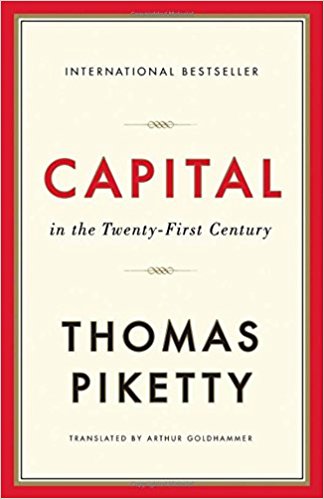We hope you love the books people recommend! Just so you know, The CEO Library may collect a share of sales or other compensation from the links on this page.
This book has 3 recommendations
Bill Gates (CEO/Microsoft)
Capital sparked a fantastic global discussion this year about inequality. Piketty kindly spent an hour discussing his work with me before I finished my review. As I told him, although I have concerns about some of his secondary points and policy prescriptions, I agree with his most important conclusions: inequality is a growing problem and that governments should play a role in reducing it. I admire his work and hope it draws in more smart people to study the causes of, and cures for, inequality.Lucas Morales (Founder & CEO/Zeall.us)
Depending on your interest and goals, if you are like me and always looking for the trends in the big picture then I highly recommend being an active contrarian reader. Read what no one else is reading. Your goal is to think outside the box. To look at the world and ask “why hasn’t this been solved?” And that gives you a roadmap as to what opportunities may exist for your entrepreneurial efforts. So to that, here’s a snapshot, in no particular order, of what might help you push your intellectual boundaries:
- Born a Crime: Stories from a South African Childhood by Trevor Noah
- 23 Things They Don't Tell You About Capitalism by Ha-Joon Chang
- Postcapitalism: A Guide to Our Future by Paul Mason
- Capital in the Twenty-First Century by Thomas Piketty
- Who Gets What--And Why: The New Economics of Matchmaking and Market Design by Alvin E. Roth
- The Political Economy of Participatory Economics by Michael Albert and Robin Hahnel
- The Zero Marginal Cost Society: The Internet of Things, the Collaborative Commons, and the Eclipse of Capitalism by Jeremy Rifkin
- Why America Misunderstands the World by Paul R. Pillar
- A Theory of Justice by John Rawls
- Prisoners of Geography by Tim Marshall
David Heinemeier Hansson (Co-Founder/Basecamp)
This is the book that was catapulted by its conclusion: r > g. That the rate of return on capital is greater than the growth rate of the economy. Which means that capital, and the people who own it, will end up with a larger and larger share of all wealth and income in the economy as time goes on.
It’s a dense dive into the historical data on wealth, income, and economic growth from the optic of inequality. It’s fascinating to realize just how little economic growth there was before the industrial revolution (<0.1% at times). Centuries would pass where societies got almost no more productive, and thus saw no per-capita growth.
In the past few decades, we’ve moved closer to the historical norm. Real growth through productivity improvements is down a lot since that former golden period, most western societies aren’t growing their population as rapidly as they were, and thus hereditary wealth and privileges are coming back as prime determinants of inequality.
Despite the dense approach, the book isn’t in anyway unapproachable. It’s well told and easily read. And it’s about as timely as it gets. Highly recommend it so far.
Amazon description
What are the grand dynamics that drive the accumulation and distribution of capital? Questions about the long-term evolution of inequality, the concentration of wealth, and the prospects for economic growth lie at the heart of political economy. But satisfactory answers have been hard to find for lack of adequate data and clear guiding theories. In Capital in the Twenty-First Century, "Thomas Piketty analyzes a unique collection of data from twenty countries, ranging as far back as the eighteenth century, to uncover key economic and social patterns. His findings will transform debate and set the agenda for the next generation of thought about wealth and inequality.
Piketty shows that modern economic growth and the diffusion of knowledge have allowed us to avoid inequalities on the apocalyptic scale predicted by Karl Marx. But we have not modified the deep structures of capital and inequality as much as we thought in the optimistic decades following World War II. The main driver of inequality--the tendency of returns on capital to exceed the rate of economic growth--today threatens to generate extreme inequalities that stir discontent and undermine democratic values.
But economic trends are not acts of God. Political action has curbed dangerous inequalities in the past, Piketty says, and may do so again. A work of extraordinary ambition, originality, and rigor, Capital in the Twenty-First Century "reorients our understanding of economic history and confronts us with sobering lessons for today.
Get this book on Amazon | Barnes & Noble | Book Depository | iBooks
See more books recommended by
Bill Gates, Lucas Morales, David Heinemeier Hansson
See more books written by
Sources
- The Best Books I Read in 2014
- Lucas Morales, Founder & CEO of Zeall.us, Gave Entrepreneurship Its First Shot at the Age of 14
- The books I read in 2018





